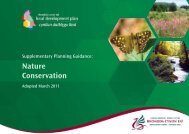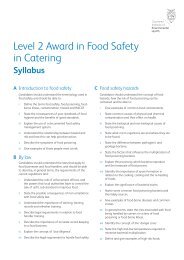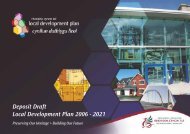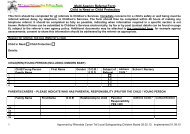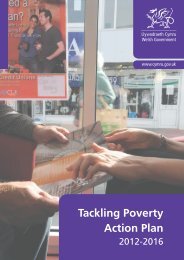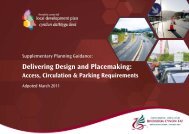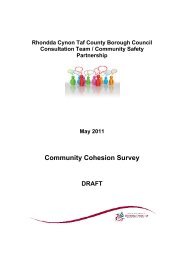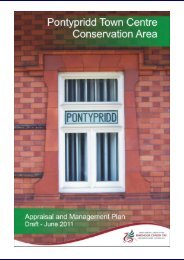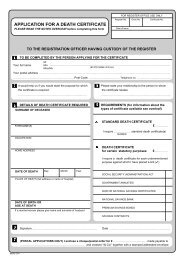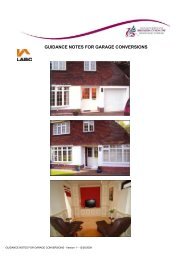Cynllun Iaith Gymraeg - Rhondda Cynon Taf
Cynllun Iaith Gymraeg - Rhondda Cynon Taf
Cynllun Iaith Gymraeg - Rhondda Cynon Taf
- No tags were found...
You also want an ePaper? Increase the reach of your titles
YUMPU automatically turns print PDFs into web optimized ePapers that Google loves.
3. DEALING WITH THE WELSH SPEAKING PUBLIC3.1 Written CommunicationThe public are welcome to deal with the Council in writing ineither Welsh or English. Every written communication e.g.letter and e-mail received in Welsh will receive a reply inWelsh. And will adhere to any standards set e.g. in thecorporate feedback scheme.Electronic mail sent to the general public including clientgroups must be considered as a standard means ofcorrespondence and therefore circular letters, bulletins,newsletters must continue to be bilingual irrespective ofmedium used to disseminate the information.If the Council is aware that an individual, group or organisationprefers to receive letters in Welsh, then the language of lettersinstigated by the Council will be Welsh. Following initialcorrespondence, face-to-face interview, or telephone callconducted through the medium of Welsh, anycorrespondence required will be written in Welsh, unlessthe member of the public has indicated otherwise.The Council has established a database of individualswho prefer to correspond or deal in Welsh and havegiven their permission to be included on thedatabase. Where possible, language choice has beenrecorded on a number of individual backroomsystems. The Council are working towardsdisseminating this across their other computerbased and paper systems although given the sizeand complexity of the Council this will take time.In normal circumstances, circulars or standardletters, general letters despatched to the public willbe always bilingual, for example, letters sent outabout council tax, road closures and local events.3.2 Telephone CommunicationThe public are welcome to speak in Welsh or English whendealing with the Council by telephone. The initial switchboardgreeting and any answer phone messages must be bilingual.Increasingly calls are received at a dedicated customer contactcentre with access to Welsh speaking staff. While every effortwill be made to ensure this access, pragmatically there may beoccasions when this is not possible. The Council is also awarethat a WAG led project on access to bilingual services isunderway and will consider any shared provisionopportunities that may emerge when the project reaches itsconclusion (2009).As part of the Council’s Linguistic Skills Strategy a training andrecruitment policy will be developed and adopted by year twoof the Scheme with emphasis on employingenough bilingual staff to provide a bilingualservice.If a caller wishes to speak Welsh, the operator/ officer will direct the call to a Welshspeakingmember of staff. If a Welsh speakeris not available, the caller will be given thechoice of a Welsh speaker returning thecall as soon as possible, or continuing thecall in English. On some occasions,complex or specialised telephoneenquiries may have to be answered inEnglish.3.3 Meetings of the CouncilIn full Council meetings the Welsh and English languages willbe given the same status and validity, wherever and wheneverpracticable.Notices of full Council meetings will be bilingual and will statethat a translation of the minutes of such meetings will beprovided in Welsh, when requests are received from membersof the public.When and where consideredpracticable by the Council,agendae for these meetings willbe provided bilingually.





